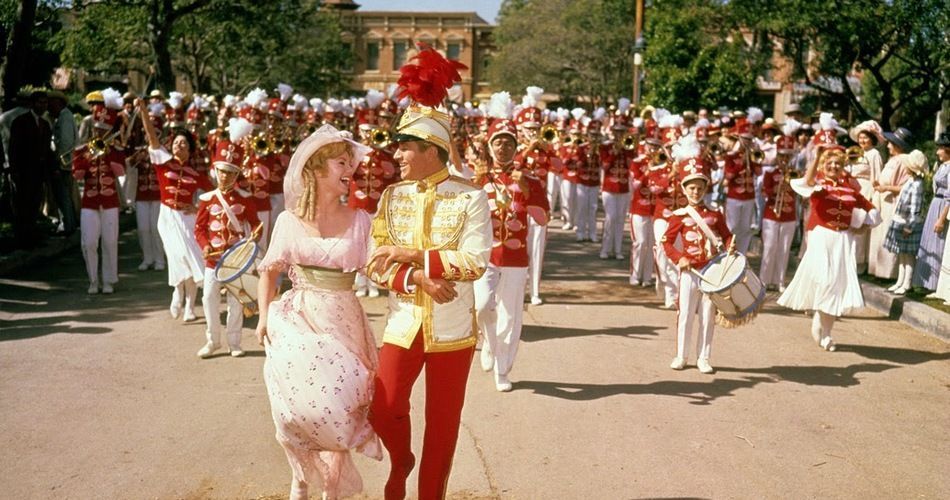Mason City, Iowa, the boyhood home of composer Meredith Willson, was the inspiration for one of the American theater’s most popular musicals of all time.
Since it opened on Broadway in 1957, The Music Man has been in constant production somewhere in the world and twice adapted for film. The popularity of the 1962 movie sparked a resurgence in high school band and orchestra programs, and it brought attention to the hometown of the show’s brilliant writer, composer, and lyricist.
The Music Man has been revived on Broadway three times, most recently in a triumphantly successful run starring Hugh Jackman and Sutton Foster. Generations old and young are familiar with songs like “76 Trombones” (led the big parade), “Ya Got Trouble” (right here in River City), and “Gary, Indiana.” The show has long been a favored choice for high school and college musical productions.
It could be said the true music man was Meredith Willson (1902-1984), who set his theatrical story in the fictional River City, Iowa, an innocent small town modeled after his memories of growing up in Mason City in the early 1900s. He never forgot his roots, and the town’s affection for him shines through at The Music Man Square, a prime tourist attraction that leaves no stone unturned in chronicling a remarkable show business career.
The Music Man Square complex in Mason City, Iowa encompasses:
- A plaza with a statue of Willson wielding a march leader’s baton, an obvious selfie spot
- The hometown hero’s boyhood house
- A modern, high-ceilinged museum with artifacts, audio-visuals, and a 1912 Main Street lined with old-time storefronts, a re-creation of the movie set. Some of the stores represent real Mason City businesses (like the pool hall, still in operation under a different name). The streetscape has a museum gift shop and a working ice cream parlor.
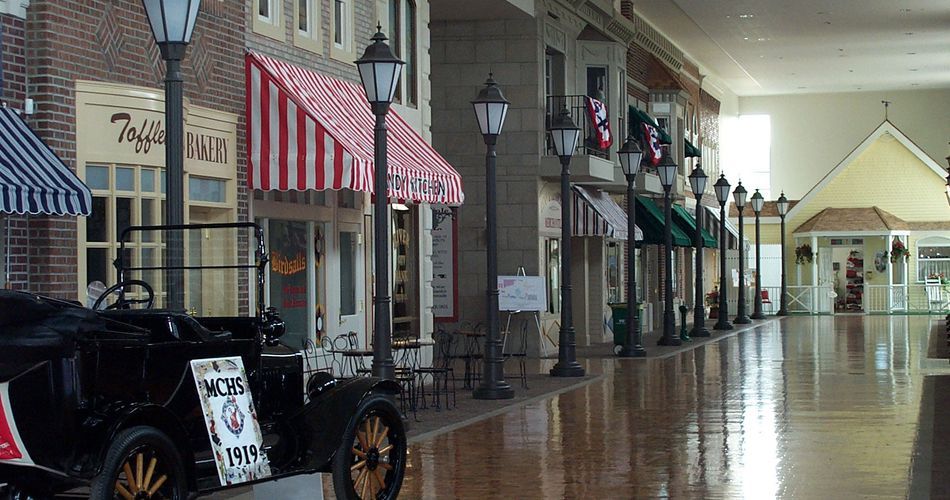
The 1912 streetscape sets the stage for visits to the Meredith Willson Museum in Mason City. (Photo credit: Visit Mason City)
Large groups split up between the Meredith Willson Boyhood Home (for a guided tour) and Meredith Willson Museum (self-guided). A meal can be arranged at the adjacent Decker House Bed & Breakfast.
Exploring the Meredith Willson Museum in Mason City
In the museum, it’s best to start by watching “Meredith Willson: Making The Music Man,” a 27-minute Warner Bros. video made in 1998 and narrated by Shirley Jones, who co-starred in the 1962 movie with Robert Preston (Professor Harold Hill, the Music Man). Clips from the film adaptation and interviews with the choreographer and actors (like comic Buddy Hackett) provide behind-the-scenes insights.
Viewers learn, for example, that some studio executives wanted Frank Sinatra to play Hill, the fast-talking traveling salesman who comes to town and convinces citizens to buy instruments, uniforms, and instruction booklets to start a boys’ band. But Willson insisted the role go to Preston, who had earned a Tony Award for his portrayal of the con artist in the Broadway play, a smash hit that won the Tony for Best Musical and ran for 1,375 performances over almost four years. The cast album spent 245 weeks on the Billboard charts.
Jones mentions that during filming—all done at the Warner Bros. studio in Burbank, California—she found out she was pregnant (with her son, future actor Patrick Cassidy) and was told not to spread the news, revealing the production team did its best to cover up the bump. Jones, who played town librarian Marian Paroo, and Ron Howard (then Ronny Howard, her little brother in the movie) are the only featured cast members still alive.
Mason City’s Palace Theater hosted The Music Man’s gala premiere. Attended by Willson and the Hollywood stars, the event highlighted a weekend of special festivities timed to coincide with the North Iowa Band Festival (which celebrates its 84th year on Memorial Day weekend 2023). Performing were more than 100 marching bands from across the U.S. One who never let fame and fortune go to his head, the internationally renowned composer often would come back to Mason City to visit family and friends, and several times returned for the annual festival.
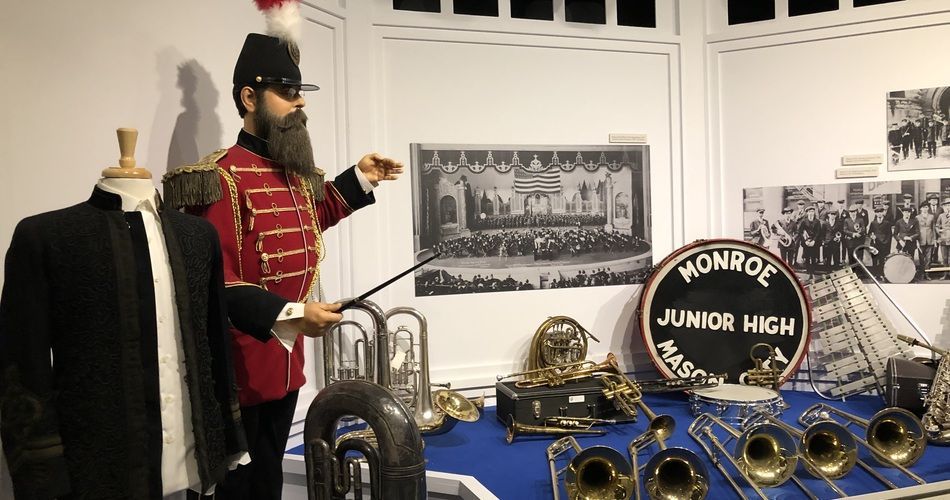
The Meredith Willson Museum spotlights Mason City’s musical heritage as well as the career of its hometown hero. (Randy Mink Photo)
At the festival in America’s Bicentennial year of 1976, Willson conducted the local municipal band, recalls Janice Rod, a band member back then and today a guide at the boyhood home. The only current staff member at The Music Man Square who had met Willson, she enjoys telling guests that he took an interest in her flute and asked if he (a flutist himself) could take a look at it. “He was so personable,” says Rod, who is heartened by the fact that he would come back to Mason City for such events.
Willson, in fact, was always willing to conduct and appear at music events around the world, gladly traveling far to lead a marching band or host an opening night for a local production of his signature show, one of the most universally cherished treasures of the American musical theater.
Willson emceed the recording industry’s first Grammy Awards ceremony in 1959, and on display in the museum is the Grammy for the cast album of The Music Man, the first Grammy Award for Best Musical Theater Album—and the first Grammy ever presented. The movie won the 1963 Academy Award for Best Musical Score and was nominated for Best Picture.
An exhibit focuses on the horse-drawn Wells Fargo wagon, which delivered all sorts of goods to small towns during the late 19th and early 20th centuries. Willson remembered the wagon’s much-anticipated arrival in Mason City, and The Music Man song “The Wells Fargo Wagon” reflects townsfolks’ excitement. In the story, the wagon was delivering the musical instruments that people had ordered.
Museum-goers also get a look at Willson’s studio, which was transplanted from his southern California home. It is furnished with pianos, musical scores, awards, and personal items.
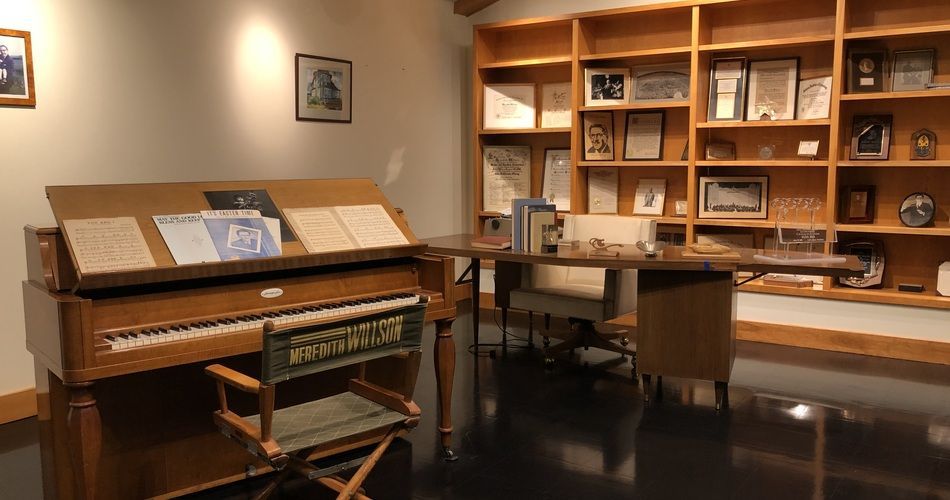
The famous composer’s studio, transplanted from southern California, is on exhibit at the Meredith Willson Museum in Mason City. (Randy Mink Photo)
The Music Man Creator’s Impressive List of Accomplishments
Reading exhibit descriptions as they explore the galleries, guests learn these facts about the native Iowan’s long list of accomplishments:
- Willson wrote the music for The Unsinkable Molly Brown, a 1960 Broadway hit that was made into a movie four years later.
- His last Broadway musical was Here’s Love, an adaptation of the popular Christmas movie Miracle on 34th Street. The 1963 show featured the song “It’s Beginning to Look a Lot like Christmas,” written by Willson in 1951 and today a holiday standard.
- Willson wrote musical scores for many Hollywood films, including Charlie Chaplin’s first talkie, The Great Dictator, in which the actor plays Adolf Hitler. Willson earned an Academy Award nomination for his work on the 1940 Chaplin classic. Clips of the movie and others (including Little Foxes starring Bette Davis) are shown in the museum’s 22-seat, vintage-style movie theater.
- One of Willson’s most famous compositions, “May the Good Lord Bless and Keep You,” was published in 1950 and used as the theme song on Tallulah Bankhead’s NBC radio program “The Big Show.” Inspired by his mother’s weekly farewell to her Sunday school class at the Congregational Church, it has been recorded by the likes of Bing Crosby, Gene Autry, Frankie Lane, and Tammy Wynette, and was regularly sung by Kate Smith on her early 1950s TV show as the closing song.
- In the early days of television, Willson hosted a series of variety shows, including “Texaco Star Parade.” He made guest appearances on TV game shows as late as 1982.
More Achievements of Meredith Willson of Mason City, Iowa
- At the age of 19 Willson joined the John Philip Sousa band playing first flute. In 1924 he joined the New York Philharmonic as second flutist, performing on the nation’s first networked radio broadcast in November 1925. Willson had studied flute at New York’s Damrosch Institute (now The Julliard School).
- Willson was the concert director for NBC Radio’s Western Division and over the years hosted and did arranging and conducting for many radio (and television) music shows. Right after America entered World War II, he joined the war effort as a volunteer and served as the civilian director of the Armed Forces Radio Service before enlisting in the Army in November 1942. After World War II, he was the musical director of the George Burns and Gracie Allen radio show.
- Willson wrote two full symphonies and hundreds of orchestra suites, along with five books, including the autobiography And There I Stood with My Piccolo.
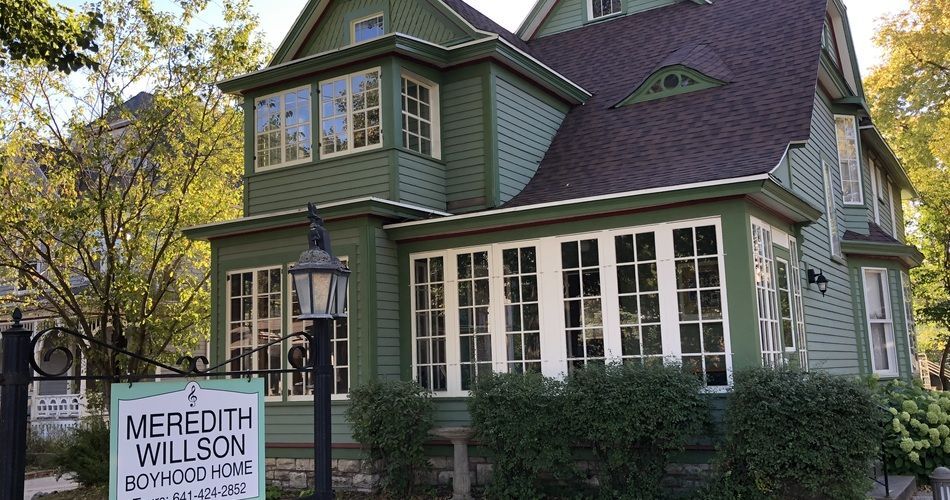
Meredith Willson Boyhood Home. (Randy Mink Photo)
Touring the Meredith Willson Boyhood Home in Mason City
On a guided tour through the boyhood home at The Music Man Square, visitors learn that when Robert Meredith Willson came into the world in 1902, he was the largest baby born in Iowa at the time, tipping the scales at 14 pounds, 6 ounces. The 1895 Queen Anne-style house is furnished with period pieces, including a few original family items and archival photos such as Meredith, his mother, and brother on their knees in prayer at bedtime.
Other Things to See and Do in Mason City, Iowa
In the heart of downtown Mason City, within easy walking distance of The Music Man Square, is the 27-room Historic Park Inn, the last remaining hotel of the six designed by Frank Lloyd Wright, America’s best-known architect. Docent-led tours of the Prairie School gem, which opened in 1910 as the City National Bank and Park Inn, spotlight art glass, furniture, lighting fixtures, and other classic Wright design elements. An extensive restoration/rehabilitation was completed in 2011. A balcony with chairs and umbrella tables, and some of the guest rooms, overlook a statue of Wright in leafy Central Park.
The boutique hotel’s lower-level bar, The Draftsman, has pool tables and oversize black-and-white photos of early Mason City. Markley & Blythe is an upscale restaurant on the main floor.
Architecture fans in Mason City also get their fix at Wright’s 1908 Stockman House, the only Prairie School house in Iowa that is open to the public. Nearby houses are featured on walking tours of the Rock Glen-Rock Crest Historic District, the world’s largest unified site of Prairie-style architecture. Included in the tours is the historic footbridge over Willow Creek that was immortalized in The Music Man (and later named in honor of Willson).
Many downtown buildings sport Wright-inspired murals, and outdoor sculptures add more artistic flair. The River City Sculptures on Parade project, featuring works by artists from around the country, is a 1.7-mile walking tour that leads participants on a looping route.
The Charles H. MacNider Art Museum claims a collection of more than 500 marionettes and puppets created by premier puppet master and Mason City native Bill Baird. One of the prime items on display is The Lonely Goatherd, which appeared in the movie The Sound of Music.
By Randy Mink, Senior Editor
Lead photo – Robert Preston and Shirley Jones starred in the 1962 movie The Music Man. (Photo courtesy of Visit Mason City)
Leisure Group Travel offers additional ideas for your next group trip and you can Subscribe for FREE for more travel content.


